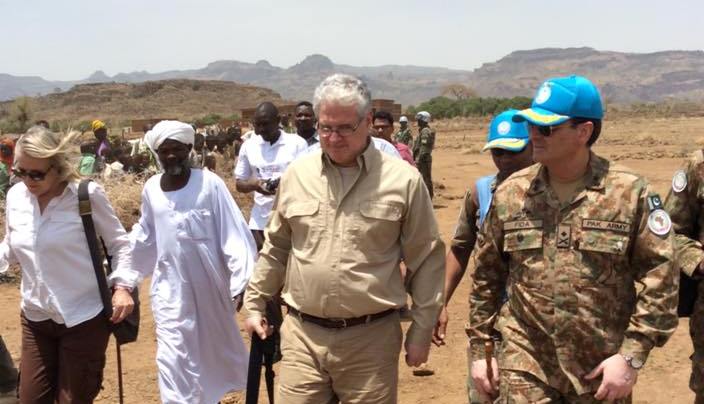Sudan’s FVP and U.S. envoy discuss permanent lift of sanctions

June 22, 2017 (KHARTOUM) – Sudanese First Vice President and Prime Minister Bakri Hassan Salih discussed the lift of economic sanctions on Sudan with the U.S. Chargé d’Affaires, Steven Koutsis on Thursday.
The meeting took place after a three-day visit by the American diplomat to three states in the western Sudan region of Darfur where he inspected the humanitarian situation of the internally displaced civilians and South Sudanese refugees.
In press statements after the meeting reported by the official news agency SUNA, Koutsis said he briefed the First Vice President on his visit to Darfur and discussed with him bilateral relations.
“The meeting touched on the Sudanese-US relations, especially the (permanent) lifting of the US sanctions on Sudan,” said the Chargé d’Affires.
He said he spoke with FVP about the positive developments and the stability in the region.
The diplomat further said they discussed the presence of the hybrid peacekeeping mission in Darfur (UNAMID), which would be reduced by a half soon. He added that Taha pledged that his government would play its role in maintaining security and stability in Darfur.
Sudanese officials seem confident that the President Donald Trump would approve the permanent revocation of the economic embargo on Sudan on 12 July.
Last week, Bloomberg reported that U. S. officials involved in the process are supportive for the permanent lift of sanctions on Sudan.
A week before to leave office on 13 January 2017, former President Barak Obama decided to reduce some economic sanction on Sudan, saying it would be effective next July after an interagency report on Khartoum’s commitment to a five track deal concluded between the two countries.
Obama was keen to indicate that the decision intends to acknowledge Sudan’s efforts to reduce internal conflict, improve humanitarian access to people requiring aid and curtail “terrorism”.
On Thursday, the International Crisis Group (ICG) backed the lift of sanctions on Sudan pointing that Washington should continue to press Khartoum for political reforms.
The independent group stressed that the east African country did limited progress but the revocation at least would bring the Sudanese government to cooperate with Washington and boost the American leverage.
The U.S. “should also make clear that it stands ready to impose new targeted financial sanctions should Khartoum renege on its commitments,” the ICG said on Thursday.
Officials at the State Department insist that Washington has sufficient sanctions and measures at hand to punish Khartoum, adding the lift of embargo will bring the Sudanese government to cooperate with them in its efforts to end the war and achieve democratic reforms.
However, the Enough Project doesn’t agree with this soft approach and called on President Donald Trump to delay his decision.
In a report released on Thursday, the group said that ” the senior U.S. government officials responsible for Africa policy who would typically play central roles in such an important decision are not yet in place, and thus are unable to weigh in on this critical decision”.
“A six-month delay in the decision would give the Trump administration time to pursue a separate, new and independent track for peace and human rights in Sudan,” said John Prendergast, Founding Director at the Enough Project.
The report further says that Washington lacks ” the verifiable information” confirming that Khartoum has observed the agreed five-tracks.
Pointing Khartoum’s commitment to protect civilians in Darfur, Omer Ismail, Senior Policy Advisor at the Enough Project said “there is ample evidence of the Sudanese government’s disregard of the safety of civilians or outright targeting of civilians,” he said pointing to the attacks by government army and militias.
(ST)
